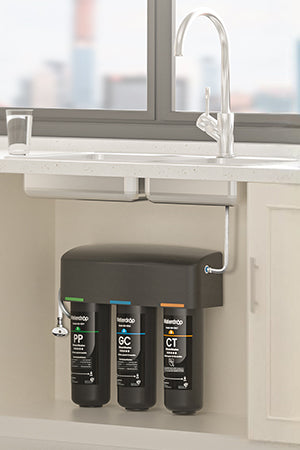Clean water is essential for a healthy lifestyle, and many households in Singapore rely on water filters to ensure the purity of their drinking water. However, with so many types of water filtration systems available, one question often arises: Do we need to clean or change a water filter? The short answer is YES.
What Occurs If You Don't Clean or Change the Water Filter?
Water filters are designed to remove impurities, contaminants, and harmful substances from the water. However, over time, these filters can become clogged with dirt, debris, and other contaminants that they've filtered out. If not cleaned or replaced regularly, a water filter will lose its efficiency and may even become a source of contamination itself.
1. Decreased Filtration Efficiency
If the water filter is not maintained, the accumulation of contaminants may close the pores on the filter, and it will be more challenging for the water to flow. This will reduce the efficacy of the filter, whereby the harmful contaminants may not filter out so efficiently. At worst, your filter will leave contaminants like bacteria, viruses, heavy metals, and chlorine in your drinking water.
2. Adulterated Water
If the water filter is dirty, the quality of the water will be poor, so the water will either taste or smell bad. This is because the filter may already be retaining impurities rather than removing them. In some conditions, bacteria will also begin to grow inside the clogged filter, so not only will the water not taste good when you drink it, but it will also not be healthy.
3. Shortened Lifespan of the Filter
Water filters are designed to be replaced or cleaned at regular intervals. If they are left uncleaned for too long, their lifespan can be significantly shortened. The accumulated contaminants can cause wear and tear on the filter material, causing it to deteriorate and become less effective at filtering water.
How Often Should We Clean a Water Filter?
How often you clean the water filter depends on the type of filter you've installed, as well as how frequently it is used. This guide provides an idea of when and how often you need to clean or replace the following types of filters:
1. Activated Carbon Filters
Activated carbon filters are also the most popular type of filters found in homes. They function through the adsorption of impurities, including chlorine,
volatile organic chemicals (VOCs) , as well as pesticides. Such filters typically have to be replaced instead of cleaned, as they will stop working after some time.
How often to replace? Activated carbon filters need to be replaced between 3 to 6 months, depending on how much water you filter and how contaminated the water is. Cleaning the filter by rinsing it with water may extend its longevity sometimes, but it's not nearly as effective as replacing it.
2. Reverse Osmosis (RO)
Reverse Osmosis (RO) filters are some of the highest-quality water filter systems available. They eliminate numerous contaminants, including dissolved substances, bacteria, and heavy metals. However, the RO membrane itself and other filters in the system must be cleaned and replaced regularly for optimum function.
How often to clean? RO filters typically need cleaning every 6 to 12 months, depending on water usage. The pre-filters (sediment and carbon filters) should be cleaned or replaced every 6 months, while the RO membrane may need to be replaced every 2 to 3 years, depending on the quality of your water and how often it is used.
3. UV Filters
Ultraviolet (UV) filters are used to disinfect water by killing harmful microorganisms such as bacteria, viruses, and protozoa. While UV filters don't accumulate debris like carbon or RO filters, they do require regular maintenance.
How often to clean? You'll need to replace the UV lamp on the system every 9 to 12 months. You might need to clean the UV chamber more often if the chamber becomes cloudy with the buildup of minerals, which will impact the performance of the UV light.
4. Ceramic Filters
Ceramic filters are often used in portable water filtration systems or for filtering out large particles and bacteria. These filters can be cleaned and reused, which makes them more economical in the long term.
How often to clean?
Clean the ceramic filters every 2 to 4 weeks, or as often as determined by the use of the filter and the quality of the water filtered. Clean the filter by scrubbing the filter with a gentle brush.
How to Clean Your Water Filter Properly
If you clean your water filter correctly, you will be able to keep it working at its best. Below is an easy guide on how to clean the most common water filters:
1. Activated Carbon Filters
Rinse the filter: For carbon filters, simply rinse them under cold water to remove any visible debris.
Replace the filter: Replace the carbon filter completely after several months so that it remains effective in eliminating contaminants.
2. Reverse Osmosis Filters
For most modern tankless reverse osmosis (RO) systems, maintaining clean and safe drinking water doesn't require complicated cleaning. Instead, it's important to replace the water filters regularly according to the manufacturer's recommendations.
Timely replacement ensures that the
RO system continues to remove contaminants effectively, keeps the water tasting fresh, and maintains overall water quality. Regular filter changes also prevent clogging, reduce the risk of bacterial buildup, and extend the lifespan of your reverse osmosis system, making it easier to enjoy consistently pure and safe drinking water at home.
3. UV Filters
Replace the UV lamp: UV lamps have limited lifetimes, so replacement will need to follow the recommendations for the brand you've purchased.
Clean the UV chamber: If you notice any mineral buildup on the UV lamp or chamber, clean it with a soft cloth or brush.
4. Ceramic Filters
Scrub the filter: Use a soft brush or sponge to gently scrub the filter surface to remove any buildup of dirt or contaminants.
Rinse thoroughly: After scrubbing, rinse the ceramic filter with cold water and let dry completely before reusing.
Why Use Waterdrop Water Filters for Better Water Quality?
In water filtration, you need to select a trustworthy system to ensure optimal water quality. Waterdrop provides quality water filters that are crafted to give you clean, safe, and delicious water. If you are looking for a reverse osmosis water filter,
Waterdrop Reverse Osmosis Hot Cold Water Dispenser A2 is the best choice for your home.
Final Words
Replacing or cleaning your water filter is crucial for its capability to filter your water effectively. Failing to maintain the filter will cause less effective filtration, low-quality water, and reduced filter lifetime. Cleaning or replacing the filter on schedule helps ensure that your water is clean, safe, and free of contaminants.





































































